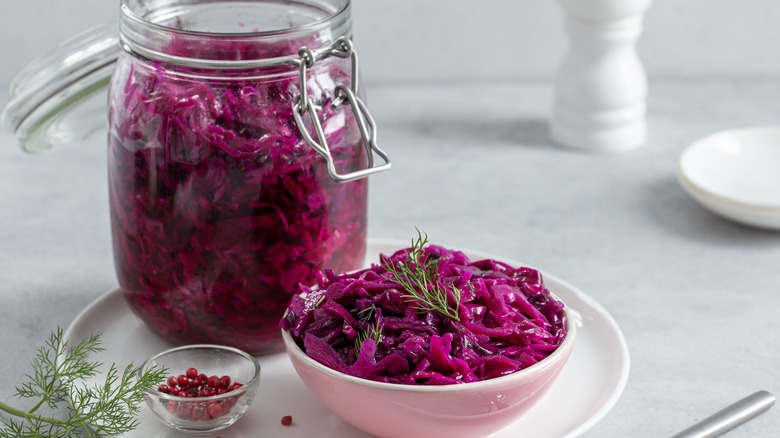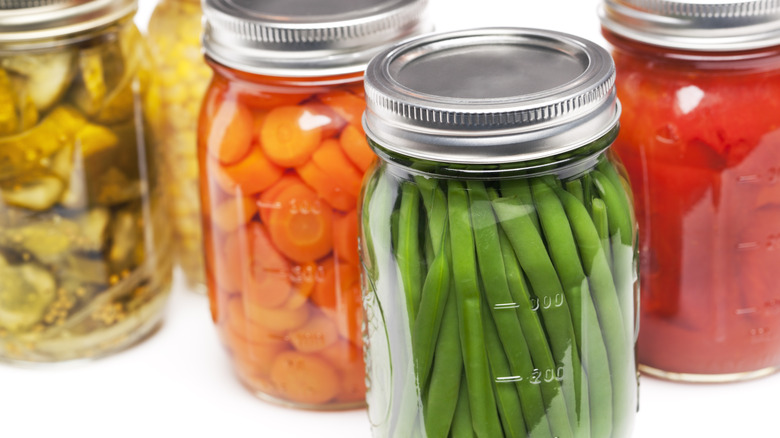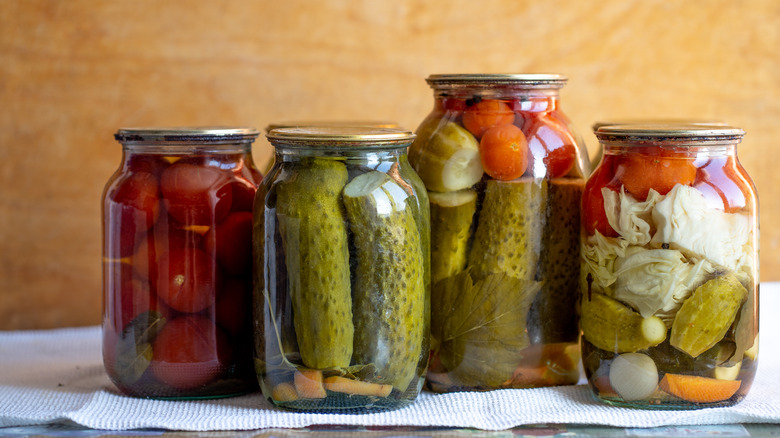For The Crunchiest Canned Pickled Cabbage, Don't Forget About The Salt
Pickled cabbage is the tangy, crunchy bite your sandwiches, grain bowls, and taco nights need. But when you open the jar to find your canned pickled cabbage has gone mushy, it can be a disappointment. The culprit is most likely salt -– and not enough of it. Salt is optional for canning and pickling, but you'd be doing yourself a disservice if you didn't salt your cabbage beforehand.
When it comes to quick pickling vegetables, there's more to the process than just slicing them up. pouring some vinegar and spices into a jar, and hoping for the best. There's a delicate ratio of salt to vinegar to water that not only makes pickled cabbage taste good and crunchy, but also prolongs its shelf life and inhibits bacterial growth. Using enough salt will do all of that for you. If you're not following a tried and tested pickling recipe, you should aim for 1 ½ to two tablespoons of salt for a one-liter jar.
Make sure to use non-iodized table salt or canning salt. Avoid any salts that have anti-caking agents in them, as they'll make the liquid cloudy. You can also search for Pickle Crisp, which is more than just table salt; it also has calcium in it to prevent the pectin in the cabbage's cell walls from breaking down and becoming mushy. Pickle crisp doesn't replace the salt, though, it just supplements the salt you're already adding.
Skipping the salt is non-negotiable when pickling veggies
Vegetables begin rotting as soon as they've been picked by releasing enzymes to break down tissues. Pickling slows this process, and doing it the right way can prolong the life of a jar of canned pickled cabbage for a while. The goal is to firm up the cell walls of the vegetable so they don't break down and become mushy. It may seem counterproductive to use salt, which draws water out, but the pickling process replaces that lost water with the pickling liquid, giving you a crunchy, tangy cabbage. If the amount of salt in a pickling recipe seems excessive, remember it's not just for flavor, it's for the quality of the end product. If you feel it's too salty the best thing to do would be to proceed as the recipe directs, then rinse the cabbage when it's time to eat.
Don't skip salting your vegetables before pickling — you can give the pickling process a jump start by soaking your cabbage in an icy salt water bath (¾ cup of salt for every 2 gallons of water), or sprinkling salt over the cabbage and allowing it to rest for up to 24 hours in the refrigerator. As the salt works through the vegetables via osmosis, the cabbage will release the water. After this salt soak, rinse the cabbage in cold water, then continue to follow a tested and approved pickle recipe. You'll be well on your way to the crunchiest canned pickled cabbage.
Other ways to keep canned, pickled veggies crunchy (and safe)
A lot of the advice for keeping canned, pickled cabbage crunchy applies to pickling just about any vegetable, so you can go forward armed with the knowledge to pickle just about anything.
We can all agree that the end goal is delicious, tangy, crunchy veggies to snack on all year, so keeping the vegetables at their peak freshness is important. Once vegetables are picked, they should be processed (whether that's canned, fermented, or frozen) as soon as possible. So if you're going to pickle that surplus of carrots from the farmer's market, either keep them in the refrigerator or soak them in ice water to keep them firm. And, if applicable, remove the blossoming end of the vegetable because it contains an enzyme that will soften the vegetable.
Vinegar doesn't just add flavors and acidity, it also preserves the vegetables. Be sure to use vinegar with 5% acidity. This is the level recommended in the USDA's canning guidelines, as it will prevent bacteria and mold growth. Using distilled white vinegar is preferred because it won't discolor the veggies. Also, always follow the recipe. Not only for taste, but for safety –- the tested ratios of salt and vinegar to water can make the difference between tasty pickles and spoiled ones.


